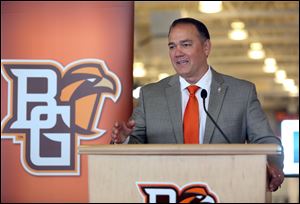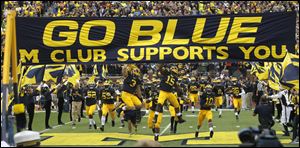
College athletic departments wrestle with impact of tax bill
2/2/2018
Premium seating at the Glass Bowl brings in $1.7 million for the University of Toledo, a figure that includes donations for the right to purchase tickets as well as suites and club seats.
BLADE PHOTO
The usual divisive political rhetoric oozed out of Washington in December, when President Trump signed the Tax Cuts and Jobs Act, the $1.5 trillion rewrite of the tax code. Republicans roared with approval, while Democrats seethed with anger.
The reaction inside college athletic departments, not the typical venue for a response to new tax laws, was one of mystery.
Athletic directors nationwide wondered how a couple of provisions would impact their coffers.
Donors no longer will be able to claim up to 80 percent of donations made to purchase tickets as a deductible contribution to charity, and universities will be responsible for a 21 percent excise tax on annual compensation above $1 million that goes to any of the university’s five most highly compensated employees.
For the Ohio States and Michigans of the world, it could cut their bottom line by millions of dollars.
Money is more valuable for “have-nots” such as Toledo and Bowling Green, who have much less to work with.
“I don’t think we know [the impact] yet,” said David Nottke, deputy director of athletics at UT.
“Until we get through a year and see what happens, we won’t really know. And every taxpayer is different. Some people itemize, some people do not. Obviously there are businesses involved, so every situation is different. My hope is it does not impact us a lot.
“One of the things we’ll tell our folks is it’s still support for our program. The money that comes in goes to support our student-athletes and making sure we compete for championships.”
The government’s take from the elimination of the 80 percent tax deduction could be as much as $200 million, according to the House Ways and Means Committee.
According to USA Today’s coaching salary database, the government also could collect $1.7 billion in revenue over 10 years from the excise tax.
At Ohio State and Michigan, the excise tax bill will creep into the millions just from the salaries of head football coaches Urban Meyer and Jim Harbaugh alone.
UT football coach Jason Candle’s new salary, which tops $1 million, could cost the Rockets an additional $231,000 because of the excise tax. That’s more than double the amount of Nick Saban’s $105,000 salary when he was UT’s coach in 1990.
“This has been a long time coming,” said Tom McMillen, a former congressman who is now president and CEO of the LEAD1 Association, which represents Football Bowl Subdivision athletic directors.
“These provisions were in previous tax bills, so it wasn’t really a surprise. I do think it will have an impact. The bigger schools are going to get hit by both the excise tax and the seat license.”
A big moneymaker
In recent decades, seat licenses, effectively a donation for the right to purchase tickets, have been a reliable source of revenue for athletic departments. Politicians have long thought the deduction wasn’t in the spirit of the law because the money spent, while technically a donation, was only made to purchase tickets at a significant value.

Bowling Green State University athletic director Bob Moosbrugger said some Falcons donors have reached out to him about the impact of the new tax bill.
Administrators of the Buckeye Club, Rocket Fund, and Falcon Club, as well as those who oversee giving at Michigan, have been scrambling since the bill was first proposed. Some departments pre-emptively contacted donors and advised them to talk to their accountants and to consider making their 2018 donations before the end of the calendar year, thus avoiding implications of the new tax law until 2019.
Anytime the words “tax deduction” are used, it piques people’s interest, which explains the surge in donations to the Rocket Fund in December.
“We were very busy between Christmas and New Year’s,” Nottke said. “It wasn’t massive, but there was more activity than normal.”
UT’s athletic budget for 2015-16, the most recent year figures are available, was $27.9 million, while Bowling Green’s was $22.8 million, lowest in the MAC. The Rocket Fund raises about $800,000 annually, which goes to scholarships for UT’s 16 sports. Premium seating brings in $1.7 million for the Rockets, a figure that includes donations for the right to purchase tickets as well as suites and club seats.
It costs as little as $100 for the right to purchase four premium seats at the Glass Bowl. Young alums can pay $25 for four tickets.
Twenty miles to the south in Bowling Green, donors can pay $10 and $25 per seat in Doyt Perry Stadium. The money goes to the Falcon Club, which provides money for athletic scholarships. There are about 2,000 donors per year who give an estimated $2 million. Money for club seating and suites goes to the stadium fund. It’s possible BGSU could change the criteria for Falcon Club gifts so they remain tax deductible, athletic director Bob Moosbrugger said.
BGSU did alert some donors to the new tax bill, and others reached out to the university.
“They’re more concerned where their seats are and what the price is,” Moosbrugger said. “They want to know: Can I get the best seats, and how much does it cost?”
At the University of Michigan, a donation of at least $150 gives you the first opportunity to purchase season tickets to football games. Season tickets are based upon availability and priority points. The more money you donate, the more points you receive.
Michigan relies on annual gifts to provide more than one-fifth of the athletic department operating budget, which is $163.8 million. A portion of that money comes from a robust Preferred Seat Donation program. Donors can make a $4,000 donation for football tickets in the indoor club, a $2,500 donation for courtside basketball seats, and a $1,500 donation can result in center-ice tickets at Yost Ice Arena.

Michigan made more than $30 million from its preferred seat donation program in the last fiscal year.
Preferred Seat Donations amounted to $30.1 million dollars in Fiscal Year 2017.
Michigan AD Warde Manuel declined comment to The Blade, but on the school’s website, Manuel issued a 291-word statement on the possible impact of the tax bill. He alerted donors if they made their Preferred Seat Donation before the end of 2017, they still would receive an 80 percent deduction.
“Preferred Seat Donations provide the necessary resources to address academic, career development, and athletic needs of more than 900 student-athletes across all 29 varsity teams,” Manuel wrote. “This program is pivotal in allowing Michigan Athletics to remain one of the few self-sustaining athletic departments in the country. With this new legislation, we will continue to assess and communicate any future changes.”
It costs $1,500 to join the Buckeye Club, which gives boosters the opportunity to purchase Ohio State football tickets. (For recent graduates and former letterwinners, it’s $250). Personal Seat Licenses for the men’s basketball program are a minimum one-time fee of $5,000, allowing buyers to purchase seats in the 200 level of Value City Arena. Season tickets in the upper level do not require a donation.
Ohio State had revenues of more than $170 million in 2015-16. The Buckeye Club raised $13.5 million from members last fiscal year for the right to purchase tickets. The entirety of that money went to student-athlete scholarships.
Ohio State AD Gene Smith declined to comment for this story. When asked for comment, Ohio State spokesman Chris Davey said, “It is still too early to have a clear picture of the impact this will have, and we continue to monitor.”
Gary Sims, the president and chairman of the board of Sims Brothers Recycling in Marion, is a longtime donor to Ohio State’s athletic programs. He endows a scholarship for the basketball team and has multiple season tickets for football and basketball. Some tickets are his personally, while others are through his business.
“I don’t contribute to get a tax write-off,” Sims said. “It’s not why I donate, and it’s not going to affect my decision in the future. It’s a relationship thing for our business, and we have to cater to our customers. But I can see how it could affect other businesses and smaller colleges. Some of the old-timers at Ohio State and Michigan could get ticked off.
“This might be the straw that breaks the camel’s back.”
UT, BG look at options
For Nottke and Moosbrugger, who have the unenviable task of working with much less revenue than their counterparts at Michigan and OSU, their hope is the network of loyal donors at their universities takes the same reasoned approach as Sims and other benefactors.
“It’s business as usual for our premium programs,” Nottke said. “Those programs are important to us. For every school, it’s a different level of revenue. If we talk next year at this time, we’ll have a better understanding. Are we going to lose a couple people? That could happen. I hope a year from now it’s all systems go. We’ll see.
“The support’s been really, really strong. The people who’ve reached out have been very understanding.”
One element that worries administrators, especially at midmajor schools, is a trickle-down financial effect that results in sports being eliminated. The University of Toledo last cut sports in 2003 (men’s swimming and men’s track and field), and Bowling Green’s last cuts were made one year before (men’s swimming and diving, men’s tennis, and men’s track and field).
Both schools require more than $10 million in subsidies from the university to fund the athletic department, but UT relies on the lowest amount of student fees and general university funds than any other Ohio MAC school.
The cost of athletic scholarships at Toledo is $8.7 million, and at Bowling Green it’s $6.5 million.
“We have 16 sports,” Nottke said. “We want to be competitive in those sports. We fully fund the scholarships in those sports. The plan would be to continue to do those things.”
Bowling Green’s athletic budget already is the lowest in the Mid-American Conference and less than what Ohio State spends on football alone. Football, men’s basketball, and men’s hockey are the three sports to which the school dedicates a lion’s share of its resources.
Baseball, men’s soccer, golf, and cross country already have been identified as being in the crosshairs at BGSU.
“Those are the four sports where I’ve talked to those coaches and said, if someone says, ‘Bob, you have to cut a million dollars out of your budget,’ I’m going to those,” Moosbrugger said.
At the recent gathering of college athletic directors, Moosbrugger said the new tax bill was among the most popular discussions, with the consensus opinion being it will affect a lot of people.
The Inter-University Council of Ohio, which represents the state’s 14 public universities, was a public critic of multiple provisions in the tax bill. (The presidents of Ohio State and Michigan penned a joint column, published in the Detroit News and the Columbus Dispatch in November, criticizing the bill.) The organization was in communication with all 14 universities throughout the bill’s proposal and passage.
Rep. Bob Latta (R., Bowling Green) said the impact on college athletics wasn’t broached by either local school before he cast his vote.
“I’ve been in contact with BGSU and UT, and [the deduction and excise tax] were subjects that neither university ever broached to me,” Latta said. “We’re always making sure that we’re reaching out, and both of the universities did not have a concern with it.”
In the deep south, where college football and Republicans are king, senators and congressmen heard complaints from constituents and athletic administrators. Clemson AD Dan Radakovich and his counterpart at South Carolina, Roy Tanner, actively lobbied Sen. Lindsey Graham (R., S.C.) to author an amendment to give athletic departments protection.
It ultimately did not happen, but the impact was not lost on Graham.
“You mess with college football,” the senator said, “you’re going to get creamed.”
Contact Kyle Rowland at krowland@theblade.com, 419-724-6110 or on Twitter @KyleRowland.